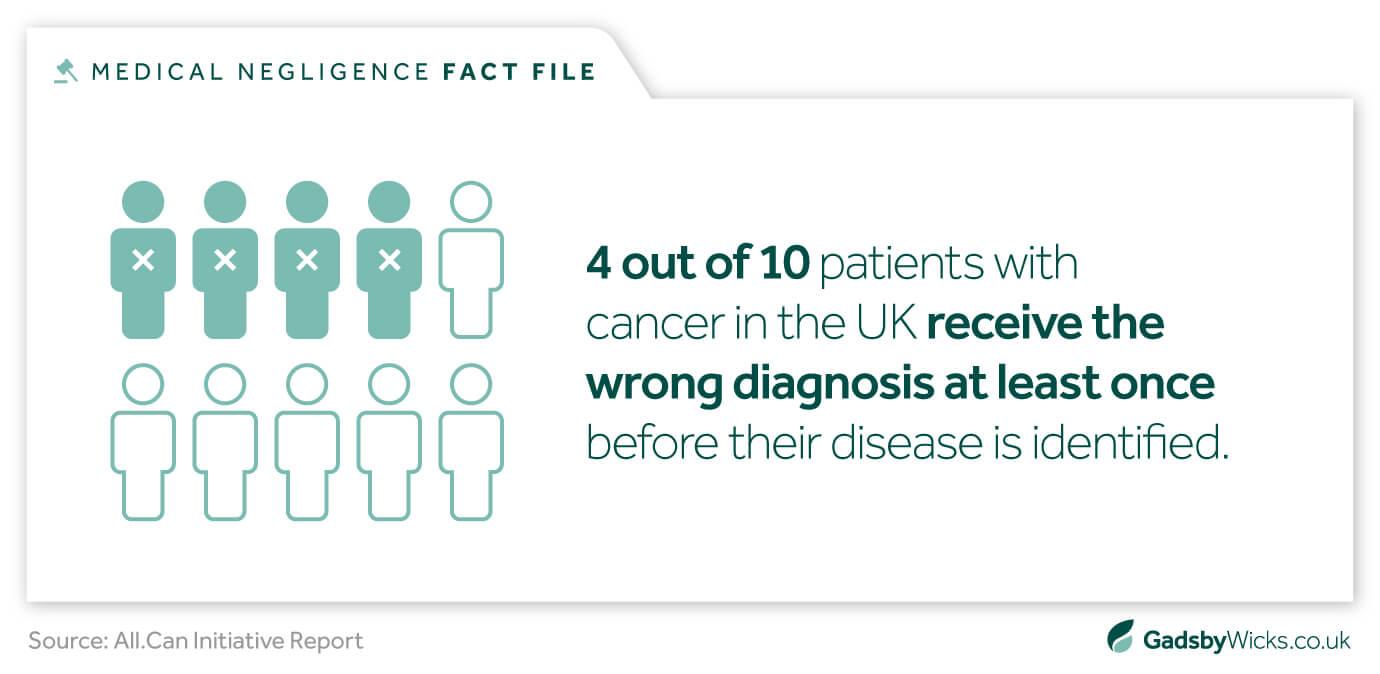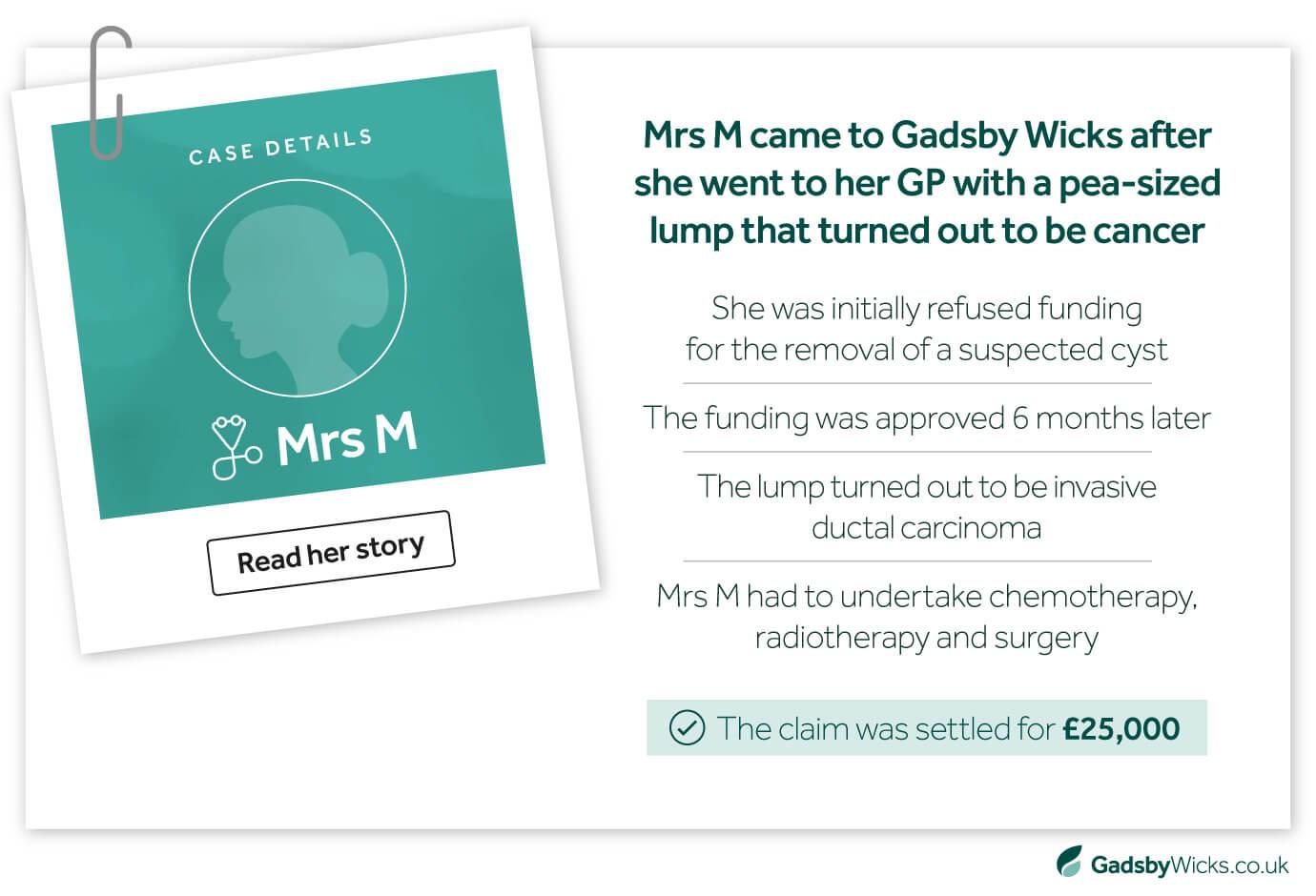- Home >
- Cancer Claims
Learning you or a loved one has cancer can be incredibly difficult to process. Finding out a misdiagnosis led to costly delays in treatment can make it all the more difficult to come to terms with.
Whether signs were overlooked, specialists were not consulted, or scans were lost – our cancer claims solicitors can help your family obtain the compensation and answers you need to close the book on this difficult chapter. With over 30 years of experience and millions won in compensation, we are the team you can always trust.

Do you have a cancer claim?
As many as 40% of cancer patients receive the wrong diagnosis at least once. While this may not cause further damage, sometimes these mistakes can lead to pain, suffering and loss that could have otherwise been prevented.
If a cancer misdiagnosis or poor treatment has impacted you or someone you know, you may be entitled to make a cancer claim. While litigation cannot turn back the clock, presenting a case can help secure your financial future, give you much-needed closure, and prevent these mistakes from hurting others in the future.

The specialist cancer claims solicitors for Essex & East Anglia
Since 1993, our cancer claims solicitors have worked tirelessly to give patients and their families the compensation, answers and justice they deserve.
If your quality of life has suffered or your life expectancy has reduced due to a cancer misdiagnosis, we will thoroughly investigate all evidence and build the strongest legal case on your behalf – a meticulous approach that ensures 96% of our cases settle before trial. We do all this on a ‘no win, no fee’ basis, meaning we only get paid if we secure your settlement.
How much could your cancer claim be worth?
What does our cancer claims process look like?

A free initial consultation
Call us, request a callback or complete our online form and we’ll assess if you have a valid medical negligence claim.

Funding your claim
Discover the ways we can fund your claim without you paying a penny at any stage of the process.

Investigating evidence
We gather medical records, witness statements and more to learn what happened to you and prove your claim.

Instructing independent medical experts
We work with impartial, experienced medical experts to establish whether your injuries were due to substandard medical care.

Valuing your claim
We assess your health and financial losses to accurately estimate how much compensation your claim is worth.

Presenting your case
We contact the Defendants and the Courts on your behalf to set out your allegations and receive a response.

Negotiating a settlement
We work to achieve a fair settlement for you outside the courtroom – this is how 96% of our cases end.

Preparing for Trial
If we must proceed to Trial, we fully prepare you for what to expect so you receive the right result in court.
FAQs about cancer claims
What is a cancer misdiagnosis?
A cancer misdiagnosis generally occurs in one of three ways:
- A healthcare professional mistakes the cancer for a different condition, which leads to a delay in diagnosis;
- A healthcare professional overlooks the possibility of signs and symptoms being cancer, which leads to a delay in diagnosis;
- A healthcare professional wrongly diagnoses a patient with cancer, when their symptoms are caused by a different condition altogether.
In the first two instances, we must consider how a patient’s cancer has progressed as a result of the delayed diagnosis. Our experts will establish:
- Was any further pain, suffering, loss or damage experienced by the patient?
- Have the treatment options available to the patient changed due to the delay?
- Has the patient’s prognosis worsened because of the delayed diagnosis?
How do I know if my cancer misdiagnosis was due to medical negligence?
Determining if your cancer misdiagnosis was negligent depends on the circumstances of what happened. It could be that you experienced a breach of duty by your GP or your medical specialist. Perhaps signs and symptoms were dismissed and there was a failure to take further action, or a radiologist misinterpreted a scan and wrongly reported information to another healthcare professional.

4 out of 10 patients with cancer in the UK receive the wrong diagnosis at least once before their disease is identified.
A misdiagnosis or delay in diagnosis may not be grounds for a cancer negligence claim if there was reasonable cause to pursue other diagnoses before this. Symptoms may have been more indicative of another condition, or it was important to rule out conditions that presented a more urgent concern to a patient’s health.
If there are no mitigating factors for a cancer misdiagnosis or a delay in treating cancer, this can be grounds for a cancer claim.
What are some situations that can lead to a successful cancer claim?
Some examples of negligent acts that can lead to a successful cancer claim include:
- A healthcare professional ordering the wrong test, such as an X-ray instead of a CT scan, where the cancer wouldn’t be visible
- A biopsy is taken from the wrong section, or not enough of a sample was taken
- A test or scan is misinterpreted
- All signs or symptoms are not taken into account, such as a patient saying that a mole that looks benign is itchy, which should prompt further investigation
- A GP or healthcare professional diagnosing ongoing pain as a muscle strain or wear and tear
Have I suffered because of a cancer misdiagnosis or delayed cancer diagnosis?
If you experience a delay due to the misdiagnosis of cancer, this can mean that the treatment you require is different or more severe, and that your long-term prognosis is worse.
For instance, you may now need chemotherapy in addition to surgery compared to six months earlier when surgery alone would have been enough. Alternatively, you may need a mastectomy for breast cancer when an earlier diagnosis might have led to you just requiring a lumpectomy and not losing your breast. Your chances of five-year survival may also have been reduced.
If you believe you have suffered due to possible misdiagnosis or delayed diagnosis of cancer, then you could be entitled to make a cancer compensation claim.
How will cancer claim compensation help me?
If a cancer misdiagnosis or improper treatment impacts a person’s quality or length of life, compensation can help support them and their family’s future.
Compensation in cancer claims can be used to cover many costs, including (but not limited to):
- Private medical treatments for cancer (such as chemotherapy, radiotherapy, surgery, etc.)
- Loss of earnings incurred while undergoing and recovering from treatment
- Any necessary equipment or aids
- Therapies or support for any psychological harm caused by the experience
- Loss of earnings caused by longer than necessary stays in hospital
If a cancer misdiagnosis or poor treatment causes a patient’s death, compensation can help support their loved one’s dependents.
How long do cancer negligence claims take to settle?
While we cannot provide a definitive timeline on any case, as each claim is unique, we typically expect a cancer negligence claim to take between two and five years to reach a final settlement. This depends on the Defendants’ stance and the time it takes to receive an accurate prognosis from medical professionals.
To ensure your misdiagnosis claim is valid and that you receive the best outcome possible, our lawyers will take the time necessary to investigate all evidence. Any promise of a quick result is usually unfounded, and moving too quickly can cause you to receive a smaller settlement than you deserve.
Contact our expert cancer claims solicitors
If you or a loved one received a cancer misdiagnosis, and it affected their prognosis, treatment options or chances of recovery – speak to someone about your options. Our team is here to listen and advise you on your next steps.

Lexcel accredited medical negligence claims solicitors
We are proud to be a Lexcel-accredited practice. The accreditation is a mark of quality and comes directly from the Law Society.
A recent assessment described us as a “Centre of Excellence” and we continue to operate to the highest standards across all main areas of our field. These include client care, case management, financial management, structure and strategy, people management, risk management, information management and file management.




Industry Recognised





